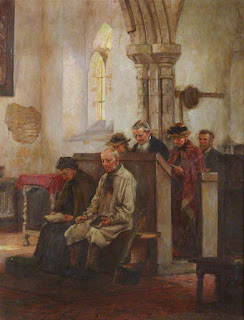'We can at no time repeat this more effectually': the post-Communion Lord's Prayer in the Prayer Book Holy Communion

Having expounded the theological and spiritual significance of the post-Communion portion of the 1662 rite, John Shepherd, his A Critical and Practical Elucidation of the Book of Common Prayer, Volume II (1801), considers the first aspect of the post-Communion, the Lord's Prayer: The Post-communion, like the Ante-communion, begins with the Lord's Prayer, and we can at no time repeat this form more properly, or more effectually, than when we have just commemorated the meritorious sufferings and death of its divine Author. It is a short but very insightful and powerful comment. That the very first words uttered in prayer by communicants, after receiving the holy Sacrament, are 'Our Father', profoundly embodies the grace given to us in the Supper of the Lord. This significantly echoes the opening words of the Prayer of Consecration: Almighty God, our heavenly Father, who of thy tender mercy ... As the Prayer of Consecration sets before us the Lord's saving Passion a...




